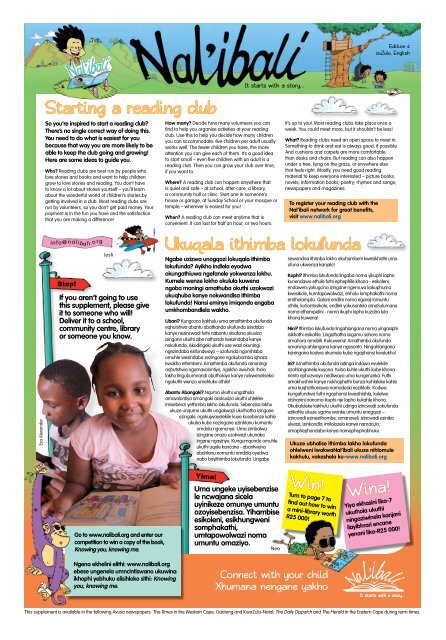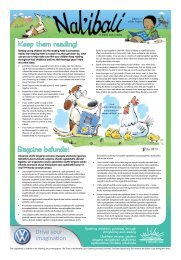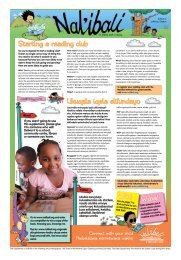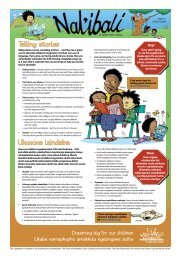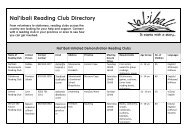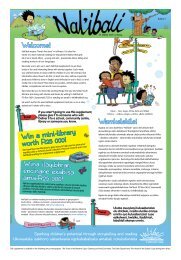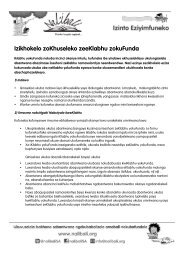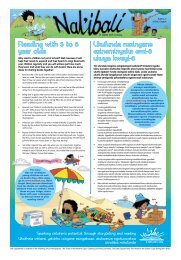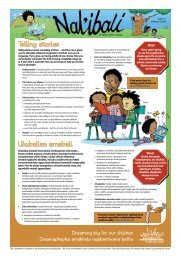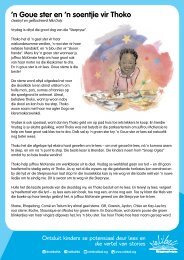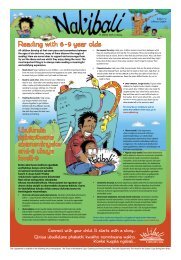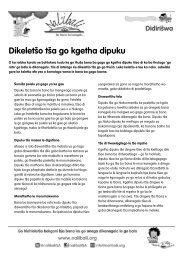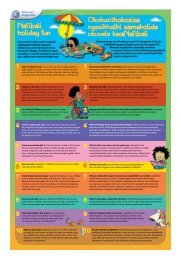Starting a reading club Ukuqala ithimba lokufunda Wina ... - Nal'ibali
Starting a reading club Ukuqala ithimba lokufunda Wina ... - Nal'ibali
Starting a reading club Ukuqala ithimba lokufunda Wina ... - Nal'ibali
You also want an ePaper? Increase the reach of your titles
YUMPU automatically turns print PDFs into web optimized ePapers that Google loves.
Edition 4<br />
isiZulu, English<br />
<strong>Starting</strong> a <strong>reading</strong> <strong>club</strong><br />
So you’re inspired to start a <strong>reading</strong> <strong>club</strong>?<br />
There’s no single correct way of doing this.<br />
You need to do what is easiest for you<br />
because that way you are more likely to be<br />
able to keep the <strong>club</strong> going and growing!<br />
Here are some ideas to guide you.<br />
Who? Reading <strong>club</strong>s are best run by people who<br />
love stories and books and want to help children<br />
grow to love stories and <strong>reading</strong>. You don’t have<br />
to know a lot about stories yourself – you’ll learn<br />
about the wonderful world of children’s stories by<br />
getting involved in a <strong>club</strong>. Most <strong>reading</strong> <strong>club</strong>s are<br />
run by volunteers, so you don’t get paid money. Your<br />
payment is in the fun you have and the satisfaction<br />
that you are making a difference!<br />
How many? Decide how many volunteers you can<br />
find to help you organise activities at your <strong>reading</strong><br />
<strong>club</strong>. Use this to help you decide how many children<br />
you can accommodate: five children per adult usually<br />
works well. The fewer children you have, the more<br />
attention you can give each of them. It’s a good idea<br />
to start small – even five children with an adult is a<br />
<strong>reading</strong> <strong>club</strong>. Then you can grow your <strong>club</strong> over time,<br />
if you want to.<br />
Where? A <strong>reading</strong> <strong>club</strong> can happen anywhere that<br />
is quiet and safe – at school, after-care, a library,<br />
a community hall or clinic. Start one in someone’s<br />
house or garage, at Sunday School or your mosque or<br />
temple – wherever is easiest for you!<br />
When? A <strong>reading</strong> <strong>club</strong> can meet anytime that is<br />
convenient. It can last for half an hour, or two hours.<br />
It’s up to you! Most <strong>reading</strong> <strong>club</strong>s take place once a<br />
week. You could meet more, but it shouldn’t be less!<br />
What? Reading <strong>club</strong>s need an open space to meet in.<br />
Something to drink and eat is always good, if possible.<br />
And cushions and carpets are more comfortable<br />
than desks and chairs. But <strong>reading</strong> can also happen<br />
under a tree, lying on the grass, or anywhere else<br />
that feels right. Mostly, you need good <strong>reading</strong><br />
material to keep everyone interested – picture books;<br />
novels; information books; poetry; rhymes and songs;<br />
newspapers and magazines.<br />
To register your <strong>reading</strong> <strong>club</strong> with the<br />
Nal’ibali network for great benefits,<br />
visit www.nalibali.org<br />
Esa Alexander<br />
info@nalibali.org<br />
Stop!<br />
Josh<br />
If you aren’t going to use<br />
this supplement, please give<br />
it to someone who will!<br />
Deliver it to a school,<br />
community centre, library<br />
or someone you know.<br />
<strong>Ukuqala</strong> <strong>ithimba</strong> <strong>lokufunda</strong><br />
Ngabe uzizwa unogqozi lokuqala <strong>ithimba</strong><br />
<strong>lokufunda</strong>? Ayikho indlela eyodwa<br />
okungathiuwa ngefanele yokwenza lokhu.<br />
Kumele wenze lokho okulula kuwena<br />
ngoba maningi amathuba okuthi uzokwazi<br />
ukuqhuba kanye nokwandisa <strong>ithimba</strong><br />
<strong>lokufunda</strong>! Nansi eminye imiqondo engaba<br />
umkhombandlela wakho.<br />
Ubani? Kungcono kakhulu uma amathimba okufunda<br />
eqhutshwa abantu abathanda ukufunda izindaba<br />
kanye nezincwadi futhi nabantu abafuna ukusiza<br />
izingane ukuthi zibe nothando lwezindaba kanye<br />
nokufunda. Akudingeki ukuthi uze wazi okuningi<br />
ngezindaba ezifundwayo – uzofunda ngomhlaba<br />
omuhle wezindaba zezingane ngokubamba iqhaza<br />
kwakho ethimbeni. Amathimba okufunda amaningi<br />
aqhutshwa ngamavolontiya, ngakho awuholi. Iholo<br />
lakho lingubumnandi obutholayo kanye nokweneliseka<br />
ngokuthi wenza umehluko othile!<br />
Abantu Abangaki? Nquma ukuthi ungathola<br />
amavolontiya amangaki azokusiza ukuthi uhlelele<br />
imisebenzi yethimba lakho <strong>lokufunda</strong>. Sebenzisa lokhu<br />
ukuze unqume ukuthi ungakwazi ukuthatha izingane<br />
ezingaki: ngokujwayelekile kuye kusebenze kahle<br />
ukuba kube nezingane ezinhlanu kumuntu<br />
omdala ngamunye. Uma zimbalwa<br />
izingane onazo uzokwazi ukunaka<br />
ingane ngayinye. Kungumqondo omuhle<br />
ukuthi uqale kancane - abantwana<br />
abahlanu nomuntu omdala oyedwa<br />
nabo bay<strong>ithimba</strong> <strong>lokufunda</strong>. Ungabe<br />
sewandisa <strong>ithimba</strong> lakho ekuhambeni kwesikhathi uma<br />
ufuna ukwenza kanjalo!<br />
Kuphi? Ithimba <strong>lokufunda</strong> lingaba noma yikuphi lapho<br />
kunendawo ethule futhi ephephile khona - esikoleni,<br />
endaweni yokugcina izingane ngemuva kokuphuma<br />
kwesikole, kumtapowolwazi, ehholo lomphakathi noma<br />
emtholampilo. Qalani endlini noma egaraji lomuntu<br />
othile, kuSontosikole, endlini yokusontela amaSulumane<br />
noma ethempelini - noma ikuphi lapho kuzoba lula<br />
khona kuwena!<br />
Nini? Ithimba <strong>lokufunda</strong> lingahlangana noma yingasiphi<br />
isikhathi esikahle. Lingathatha isigamu sehora noma<br />
amahora amabili. Kukuwena! Amathimba okufunda<br />
amaningi ahlangana kanye ngesonto. Ningahlangana<br />
kaningana kodwa akumele kube ngaphansi kwalokhu!<br />
Ini? Amathimba okufunda adinga indawo evulekile<br />
azohlanganela kuyona. Kuba kuhle ukuthi kube khona<br />
nento ephuzwayo nedliwayo uma kungenzeka. Futhi<br />
amakhushini kanye nokhaphethi benza kuhlaleke kahle<br />
uma kuqhathaniswa namadeski nezihlalo. Kodwa<br />
kungafundwa futhi ngaphansi kwesihlahla, kulelwe<br />
otshanini nanoma ikuphi nje lapho kukahle khona.<br />
Okubaluleke kakhulu ukuthi udinga izincwadi zokufunda<br />
ezikahle ukuze ugcine wonke umuntu enogqozi –<br />
izincwadi ezinezithombe; amanoveli; izincwadi ezinika<br />
ulwazi; izinkondlo; imilolozelo kanye namaculo;<br />
amaphephandaba kanye namaphephabhuku.<br />
Ukuze ubhalise <strong>ithimba</strong> lakho <strong>lokufunda</strong><br />
ohlelweni lwakwaNal’ibali ukuze nihlomule<br />
kakhulu, vakashela ku-www.nalibali.org<br />
Go to www.nalibali.org and enter our<br />
competition to win a copy of the book,<br />
Knowing you, knowing me.<br />
Yima!<br />
Uma ungeke uyisebenzise<br />
le ncwajana sicela<br />
uyinikeze omunye umuntu<br />
ozoyisebenzisa. Yihambise<br />
esikoleni, esikhungweni<br />
somphakathi,<br />
umtapowolwazi noma<br />
umuntu omaziyo.<br />
Neo<br />
Win!<br />
Turn to page 7 to<br />
find out how to win<br />
a mini-library worth<br />
R25 000!<br />
<strong>Wina</strong>!<br />
Yiya ekhasini lika-7<br />
ukuthola ukuthi<br />
ningaziwinela kanjani<br />
ilayibhrari encane<br />
yenani lika-R25 000!<br />
Ngena ekhelini elithi: www.nalibali.org<br />
ebese ungenela umncintiswano ukuwina<br />
ikhophi yebhuku elisihloko sithi: Knowing<br />
you, knowing me.<br />
Connect with your child<br />
Xhumana nengane yakho<br />
This supplement is available in the following Avusa newspapers: The Times in the Western Cape, Gauteng and KwaZulu-Natal; The Daily Dispatch and The Herald in the Eastern Cape during term times.
Every second week in Beacon Bay, East<br />
London, the Sinempumelo Reading<br />
Club meets. This <strong>club</strong> was started in<br />
April 2011 so it’s just over a year old<br />
now! Khanyisile Ngalo, who has been<br />
involved from the beginning, talks<br />
about the <strong>club</strong> and reflects on what it<br />
has meant to him.<br />
What is your role at the <strong>reading</strong> <strong>club</strong>?<br />
I do all the organising like making sure everyone<br />
knows when we will be meeting, arranging<br />
transport for the volunteers and communicating<br />
with the school where we meet. I’ve always been involved<br />
in facilitating some activities at the <strong>club</strong> and I still do that.<br />
Why do you do it?<br />
Bella<br />
Katherine Muick. © ST<br />
Story stars<br />
Being involved in this <strong>reading</strong> <strong>club</strong> is one of the most fulfilling things in my life. It is<br />
such a joyful experience to read to someone – it moves me to see the words jump<br />
off the pages of a book! But also, it is one way of addressing the crisis in education in<br />
our country.<br />
What have you learnt from being involved in the <strong>reading</strong> <strong>club</strong>?<br />
I have come to learn that stories are a powerful way of providing people with a<br />
mirror to look at the world. I have experienced the ways in which stories connect<br />
us all.<br />
What is the biggest challenge when it comes to running a <strong>reading</strong> <strong>club</strong>?<br />
When we have too many children at a session! If there are too many children, it’s<br />
frustrating because you don’t get enough time to interact personally with each child,<br />
which is very important.<br />
What languages do you use at your <strong>reading</strong> <strong>club</strong>?<br />
IsiXhosa and English. One Saturday we use mainly isiXhosa and then the next time<br />
we meet we use mainly English.<br />
If your <strong>reading</strong> <strong>club</strong> could send one message to South Africa about <strong>reading</strong> for<br />
enjoyment, what would it be?<br />
Reading will open your mind and open doors for you in the future. It will also give you<br />
a better understanding of different cultures and a greater insight into human nature.<br />
But the main reason you should read, is simply because it is fun!<br />
"It's in your hands!"<br />
The world celebrates Mandela Day on 18 July each year. On this day you are asked to<br />
give 67 minutes of your time to make the world a better place. In 2012, why not do this by<br />
telling or <strong>reading</strong> stories at a nearby library, school or community centre? Or choose 67<br />
stories to read or tell children before Mandela Day in 2013. You can make a difference in a<br />
child's life today... It starts with a story!<br />
"Kusezandleni zakho!"<br />
Umhlaba ugubha Usuku lukaMandela mhla ziyi-18 kuJulayi minyaka yonke. Ngalolu suku<br />
ucelwa ukuba unikele ngemizuzu engama-67 esikhathini sakho ukuze wenze umhlaba ube<br />
yindawo engcono. Kungani ungenzi lokhu ngo-2012 ngokuxoxa noma ngokufunda izincwadi<br />
zezindaba kumtapowolwazi oseduzane, esikoleni noma esikhungweni somphakathi? Noma<br />
uma ungakwazi ukwenza lokhu, khetha izindaba ezingama-67 ozozifundela noma uzixoxele<br />
izingane ngaphambi kokufika koSuku lukaMandela lwango-2013. Ungakwazi ukwenza umehluko<br />
empilweni yengane namhlanje... Lokhu kuqala ngendaba!<br />
ISinempumelelo Reading Club ihlangana<br />
njalo ngemuva kwamasonto amabili<br />
eBeacon Bay e-East London. Leli thimba<br />
laqala ngo-Ephreli 2011, lokhu kuchaza<br />
ukuthi linesikhathi esingaphezudlwana<br />
konyaka manje likhona! UKhanyisile<br />
Ngalo owayekhona kusukela ekuqaleni<br />
kwalo ukhuluma ngethimba bese echaza<br />
nangokuthi lisho ukuthini kuyena.<br />
Yiliphi iqhaza olibambile kuleli thimba <strong>lokufunda</strong>?<br />
The Sinempumelo Reading Club<br />
Ngenza konke okuphathelene nokuhlelela <strong>ithimba</strong><br />
okufana nokuqinisekisa ukuthi wonke umuntu uyazi ukuthi<br />
sizohlangana nini, ukuhlela izinto zokuhamba zamavolontiya kanye nokuxhumana<br />
nesikole esihlanganela kusona. Bengilokhu ngibambe iqhaza ekuhleleleni okuthile<br />
okwenziwa y<strong>ithimba</strong>, namanje ngisakwenza futhi lokho.<br />
Yini wenze lokhu?<br />
Abavelele<br />
ezindabeni<br />
Ukubamba iqhaza kuleli thimba <strong>lokufunda</strong> kungenye yezinto ezingigculisa kakhulu<br />
empilweni yami. Kuyinto ethokozisa kakhulu ukufundela omunye umuntu –<br />
kuyangithinta kakhulu ukubona amagama “ephuma” emakhasini encwadi! Kanti futhi<br />
kungenye yezindlela zokulungisa inkinga enkulu ebhekene nezemfundo ezweni lakithi.<br />
Yini oyifunde ekubambeni kwakho iqhaza ethimbeni <strong>lokufunda</strong>?<br />
Sengifunde ukuthi izindaba ziyindlela enamandla kakhulu yokuhlinzeka abantu ngesibuko<br />
sokubheka umhlaba. Sengibone nendlela izindaba ezisixhumanisa ngayo sonke.<br />
Iyiphi inselele enkulu ekuqhubeni <strong>ithimba</strong> <strong>lokufunda</strong>?<br />
Kulapho sinezingane eziningi kakhulu emhlanganweni ohleliwe ngamunye! Uma<br />
kunezingane eziningi kakhulu kuyakhathaza ngoba awusitholi isikhathi sokuxhumana<br />
nengane ngayinye, okuyinto ebaluleke kakhulu.<br />
Nisebenzisa ziphi izilimi ethimbeni lenu <strong>lokufunda</strong>?<br />
IsiXhosa nesiNgisi. Ngomunye uMgqibelo sisebenzisa isiXhosa kakhulu bese<br />
sisebenzisa isiNgisi kakhulu ngesikhathi esilandelayo.<br />
Uma <strong>ithimba</strong> lenu <strong>lokufunda</strong> belingathumela umlayezo owodwa eNingizimu Afrika<br />
mayelana nokufundela ukuzithokozisa, ubungathini?<br />
Ukufunda kuzovula umqondo wakho bese kukuvulela neminyango esikhathini esizayo.<br />
Kuzokwenza futhi ukuthi uqonde kangcono ngamasiko ahlukene kanye nokuqonda<br />
kabanzi mayelana nabantu. Kodwa isizathu esisemqoka sokuthi kumele ufunde<br />
esokuthi kumnandi nje!<br />
To read more from Khanyisile Ngalo go to the Story Stars<br />
section on www.nalibali.org. If you know of a <strong>reading</strong> <strong>club</strong>,<br />
parent, caregiver or organisation working hard to root <strong>reading</strong><br />
and writing into children’s daily lives, tell us about them at<br />
www.nalibali.org and we could feature them here!<br />
Ukuze ufunde kabanzi ngoKhanyisile Ngalo iya esigabeni sama-Story<br />
Stars ku-www.nalibali.org. Uma wazi ngethimba <strong>lokufunda</strong>, umzali,<br />
onakekela izingane noma inhlangano esebenza kanzima ukuze<br />
igxilise ukufunda nokubhala ezimpilweni zansuku zonke zezingane,<br />
sitshele ngabo ku-www.nalibali.org kanti kungenzeka sibhale<br />
ngabo lapha!<br />
Create your own mini-book<br />
1. Take out pages 3 to 6 of this<br />
supplement.<br />
2. Fold it in half along the black<br />
dotted line.<br />
3. Fold it in half again.<br />
4. Cut along the red dotted lines.<br />
Zenzele ibhukwana lakho<br />
1. Khipha ikhasi 3 ukuya ku 6 kulolu shicilelo.<br />
2. Lisonge libe nguhafu lapho kunomugqa<br />
(ulayini) wamachashaza amnyama khona.<br />
3. Lisonge libe nguhafu futhi.<br />
4. Sika lapho kunomugqa wamachashaza<br />
abomvu khona.<br />
2
Get story active!<br />
All children get sick sometimes and many young children have<br />
to deal with being chronically or terminally ill. The Little Hare<br />
helps sick children understand that they are not alone and that<br />
someone will help ease their discomfort and fear. It reminds<br />
them that there are people who love and value them. The book<br />
also helps develop empathy for children who have chronic<br />
illnesses. After you and your children have read The Little Hare,<br />
try out some of these ideas.<br />
If you have 10 minutes…<br />
• Look at the pictures again with your children. Talk about what the little hare<br />
does in each of the pictures and how he feels.<br />
• Talk about what makes your children feel better when they are scared or not<br />
feeling well. Also share the things that help you to feel better.<br />
If you have 30 minutes…<br />
• Ask your children to remember a time when they were unwell and to write a<br />
story about this, or to draw a picture and write about it.<br />
• Look at the activities that make the hare feel better. Choose one of these to<br />
do with your children – draw pictures together, play one of their favourite<br />
games with them or sing some of their favourite songs together.<br />
If you have one hour…<br />
• Let your children use paper plates or other cardboard to create masks with<br />
a different expression on each side – for example, a happy face and a sad<br />
face. They can use the masks to retell or act out this story, or to act out their<br />
own stories. They could also display them on the fridge or a bedroom door<br />
to show how they feel during the course of a day.<br />
• Create hare ears with your children. Draw the shape of the ears on thin<br />
cardboard (like the kind used for cereal boxes) and then let your<br />
children cut them out and colour or paint them. Use an Alice band<br />
or hair grips to attach them to your child’s head.<br />
Here are two other stories that help children to deal<br />
with illness and death: Remembering Mommy<br />
(New Africa Books) which is available in all South<br />
African languages and The Dead Bird by Margaret<br />
Wise Brown (Harper Collins).<br />
Nazi ezinye izindaba futhi ezisiza izingane<br />
ukuthi zibhekane nokugula kanye nokushona:<br />
U-Remembering Mommy (eshicilelwe yi-New Africa<br />
Books) etholakala ngazo zonke izilimi zaseNingizimu<br />
Afrika kanye ne-The Dead Bird ebhalwe nguMargaret<br />
Wise Brown (eshicilelwe yi-Harper Collins).<br />
Yenza indaba iphile!<br />
Izingane zonke zike zigule, futhi izingane ezincane eziningi<br />
kumele zibhekane nokuphathwa izifo ezingalapheki noma<br />
ukugulela ukufa. Unogwaja Omncane usiza ukuthi izingane<br />
ezigulayo ziqonde ukuthi azizodwa, nokuthi ukhona umuntu<br />
ozosiza ukwehlisa ukungazizwa kahle kanye nokwesaba<br />
kwazo. Uzikhumbuza ukuthi bakhona abantu abazithandayo<br />
neziyigugu kubona. Incwadi isiza futhi nangokugqugquzela<br />
ukuzwelana nezingane eziphethwe izifo ezingelapheki.<br />
Ngemuva kokuba wena kanye nezingane zakho senifunde<br />
Unogwaja Omncane, zamani eminye yale miqondo.<br />
Uma ninemizuzu eyi-10…<br />
• Bhekani izithombe nezingane zakho futhi. Khulumani ngalokho okwenziwa<br />
unogwaja omncane esithombeni ngasinye kanye nokuthi uzizwa kanjani.<br />
• Khulumani ngokuthi yini eyenza ukuthi izingane zakho zizizwe zingcono<br />
uma zesaba noma zingazizwa kahle. Yabelanani futhi nangezinto ezinisiza<br />
ukuthi nizizwe ningcono.<br />
Uma ninemizuzu engama-30…<br />
• Cela izingane zakho ukuthi zikhumbule isikhathi lapho zazingaphilile khona<br />
bese zibhala indaba ngalokhu, noma zidwebe isithombe bese zibhala<br />
ngaso.<br />
• Bhekani izinto ezenza ukuthi unogwaja uzizwe ungcono. Khethani<br />
okukodwa kulokhu enizokwenza nezingane zakho – ukudweba izithombe<br />
ndawonye, dlalani omunye wemidlalo yenu eniyithanda kakhulu kanye<br />
nazo izingane noma nicule elinye lamaculo azo ayizintandokazi.<br />
Uma unehora...<br />
• Vumela izingane zakho ukuthi zisebenzise amapleti ephepha noma<br />
amanye amakhalibhothi okwenza izivuvu (amamaski) akhombisa ubuso<br />
obuhlukahlukene ohlangothini ngalunye – isibonelo, ubuso obujabulile<br />
kanye nobuso obudangele. Bangasebenzisa izivuvu ukuze baphinde<br />
baxoxe noma balingise indaba, noma ukuze balingise izindaba zabo.<br />
Bangazibeka futhi nasefrijini noma esicabheni segumbi lokulala ukuze<br />
bakhombise ukuthi bazizwa kanjani emini.<br />
• Yakhani amadlebe kanogwaja kanye nezingane zakho. Dwebani ukuma<br />
kwamadlebe ekhalibhothini eliwucwephe (njengohlobo olusetshenziswa<br />
kumabhokisi amasiriyeli) bese uvumela izingane zakho ukuthi ziwasike<br />
bese ziwahlobisa ngombala noma ziwapende. Sebenzisani ama-alice<br />
band noma okokubamba izinwele ukuze niwafake emakhanda<br />
ezingane zakho.<br />
Say this rhyme together and make up the actions to go<br />
with the words!<br />
A little brown rabbit popped out of the ground,<br />
Wiggled his whiskers and looked around.<br />
Another little rabbit who lived in the grass<br />
Popped his head out and watched him pass.<br />
Then both the little rabbits went hoppity hop,<br />
Hoppity, hoppity, hoppity, hop,<br />
‘Til they came to a wall and had to stop.<br />
Then both the little rabbits turned themselves around,<br />
And ran off home to their holes in the ground.<br />
Win a mini-library<br />
worth R25 000!<br />
Our wonderful sponsors have donated books so that we can give<br />
away five mini-libraries. If you live in the Western Cape, Eastern<br />
Cape, KwaZulu-Natal or Gauteng, you stand a chance of winning<br />
one of these mini-libraries for your <strong>reading</strong> <strong>club</strong> or school.* SMS<br />
NALIBALI followed by your name, the name of your <strong>reading</strong> <strong>club</strong><br />
or school, address and contact number to 32545. SMSs cost R1.<br />
Closing date: 31 July 2012<br />
* Terms and Conditions apply.<br />
Go to www.nalibali.org/supplements for more details.<br />
Yishoni lo mlolozelo ndawonye bese nenza iminyakazo<br />
ehambisana namagama!<br />
Unogwaja omncane onsundu waphuma emgodini,<br />
Wanyakazisa izindevu zawo wase uqalaza.<br />
Omunye unogwaja owawuhlala esikhotheni<br />
Walunguza wawubuka ngesikhathi udlula.<br />
Base behamba begxuma bobabili onogwaja abancane,<br />
Bagxuma, bagxuma, bagxuma, bagxuma,<br />
Baze bafika odongeni kwadingeka ukuthi bame.<br />
Base bejika bobabili onogwaja abancane,<br />
Bagijima baya ekhaya emigodini yabo.<br />
<strong>Wina</strong> ilayibhrari encane<br />
yenani lika-R25 000!<br />
Abaxhasi bethu abayisimanga banikezele ngamabhuku ukuze sinikeze<br />
ngamalayibhrari amancane amahlanu. Uma uhlala eNtshona Kapa, eMpuma<br />
Kapa, eKwaZulu-Natal noma eGauteng, unethuba lokuwinela i-<strong>club</strong> yenu youfunda<br />
noma isikole elinye la lamalayibhrari amancane.* Thumela i-SMS yegama elithi:<br />
NALIBALI ulandelise ngegama lakho, igama le-<strong>club</strong> yenu yokufunda noma isikole,<br />
ikheli kanye nenombolo yokuxhumana ukuthumele kwinombolo ethi: 32545. I-SMS<br />
ibiza u-R1. Usuku lokuvala ngumhla ka: 31 Julayi 2012<br />
* Kukhona imibandela nezimo ezisetshenziswayo.<br />
Yiya kwi www.nalibali.org/supplements ukuthola imininingwane ebanzi.<br />
3
Story corner<br />
Here is the first part of a story about perseverance for you<br />
to read aloud or tell.<br />
The running shoes (Part 1)<br />
by Marianna Brandt<br />
Pauline was looking at the pictures of runners one morning. All she ever<br />
wanted was to be a runner. And she really, really wanted running shoes.<br />
“Pauline, let’s go to town,” called Grandpa.<br />
Pauline enjoyed going to town with Grandpa.<br />
After they got off the bus, they went to see old Mr Mokono, the<br />
shoemaker. Pauline liked the smells of leather, shoe polish and glue in<br />
his shop. And there were many kinds of shoes waiting to be fetched by<br />
their owners. Pauline noticed a pair of running shoes on the counter. She<br />
moved closer and looked at them and then at her bare feet. They were<br />
the right size and with those thick springy soles she would be able to run<br />
anywhere. She wished she could have them. When it was her Grandpa’s<br />
turn to be helped, Pauline pointed at the running shoes.<br />
Mr Mokono smiled. “Let me tell you a secret: these running shoes<br />
belonged to the Zola Budd.”<br />
Pauline’s mother had told her about this famous runner.<br />
“Yes,” Mr Mokono said, “She bought them and thought she’d like them.<br />
But then she decided to carry on running with no shoes. That’s why I still<br />
have them. But I believe they’re magic and they’re just waiting for the<br />
right person.”<br />
Pauline couldn’t<br />
keep her eyes<br />
off the running<br />
shoes. She really<br />
wanted them<br />
but knew that<br />
Grandpa could<br />
not afford them.<br />
“Do you really,<br />
really want<br />
them?” asked Mr<br />
Mokono.<br />
“Yes, I do,” she said, “I want to be a runner.”<br />
Illustration by Elizabeth Pulles<br />
Izithombe ngu-Elizabeth Pulles<br />
“You do?” Mr Mokono said, “Well, then I have a plan. You can borrow<br />
them and if you win a race at sports day, you can keep them. Go and<br />
start training!”<br />
Pauline couldn’t believe her ears. She started training immediately. That<br />
evening Pauline put on the running shoes and ran to the top of the hill to<br />
show her granny. In the morning she ran to the shop and at sunset she<br />
ran to the bus stop to fetch her mother. Before school she ran ten times<br />
round the playground and after school she jogged with the soccer team.<br />
Each time she ran, she went a little further and a little faster.<br />
Do you think Pauline will win a race and get to keep the<br />
shoes? Find out next week.<br />
Ikhona lendaba<br />
Nansi ingxenye yokuqala yendaba emayelana<br />
nokuphikelela ozoyifunda kakhulu noma ozoyixoxa.<br />
Amateki okugijima (Ingxenye<br />
yoku-1) Ibhalwe nguMarianna Brandt<br />
Ngelinye ilanga ekuseni uPauline wayebheke izithombe zabagijimi.<br />
Ukuphela kwento ayefisa ukuba yiyo kwakuwukuba umgijimi. Futhi<br />
wayezowadinga ngempela amateki okugijima.<br />
“Ake siye edolobheni Pauline,” kumemeza uMkhulu.<br />
UPauline wayekuthokozela ukuya edolobheni noMkhulu.<br />
Ngemuva kokwehla ebhasini bayobona uMnumzane Mokono<br />
owayekhanda izicathulo owayesekhulile. UPauline wakuthanda ukunuka<br />
kwesikhumba, upholishi wezicathulo kanye neglu okwakusesitolo sakhe.<br />
Futhi zaziningi izinhlobo zezicathulo ezazilinde ukulandwa abanikazi<br />
bazo. UPauline wabona amateki okugijima ayesekhawunteni. Wasondela<br />
wawabuka, wawabukisisa wase ebuka izinyawo zakhe ezingenazicathulo.<br />
Ayewusayizi wakhe futhi enengaphansi lawo eliqinile elalinokusazipringi<br />
okwakuzomenza akwazi ukugijima noma ikuphi. Wafisa sengathi angaba<br />
awakhe. Ngesikhathi sekuyithuba likaMkhulu wakhe lokuba asizwe,<br />
uPauline wakhomba amateki.<br />
Wamamatheka uMnumzane Mokono. “Ake ngikutshele imfihlo: lawa<br />
mateki kwakungakaZola Budd.”<br />
Umama kaPauline wayeke wamtshela ngalo mgijimi odumile.<br />
“Yebo,” kwasho uMnumzane Mokono, “Wawathenga futhi ecabanga ukuthi<br />
uzowathanda. Kodwa wanquma ukuqhubeka nokugijima ngezinyawo.<br />
Yingakho esekimina nje. Kodwa ngikholwa ukuthi anomlingo, nokuthi<br />
alindele umuntu ofanele.”<br />
UPauline wayengakwazi ukususa amehlo akhe ematekini okugijima.<br />
Wayewafuna ngempela, kodwa wayazi ukuthi uMkhulu wakhe angeke abe<br />
nayo nemali yawo.<br />
“Ngabe uwafuna ngempela?” kubuza uMnumzane Mokono.<br />
“Yebo ngiyawafuna,” kusho yena. “Ngifuna ukuba ngumgijimi.”<br />
“Uyawafuna?” UMnumzane Mokono wayesethi, “Empeleni nginecebo.<br />
Ungawaboleka, kanti uma uwina umqhudelwano ngosuku lwezemidlalo<br />
esikoleni angaba ngawakho. Hamba uyoqala ukuziqeqesha!”<br />
UPauline akazange akukholwe lokho ayekuzwa. Waqala ukuziqeqesha<br />
ngaleso sikhathi. Kusihlwa ngalelo la nga uPauline wagqoka amateki<br />
okugijima wase egijima ekhuphuka umqansa ukuze ayokhombisa ugogo<br />
wakhe. Wagijima waya esitolo ekuseni, ngokushona kwelanga wagijima<br />
waya esitobhini sebhasi eyolanda umama wakhe. Wagijima wazungeza<br />
inkundla yokudlala kalishumi ngaphambi kokungena kwesikole, wagijima<br />
neqembu lebhola likanobhutshuzwayo ngemuva kokuphuma kwesikole.<br />
Njalo nje uma egijima laliba lide kunakuqala ibanga aligijimile, nejubane<br />
lide likhula.<br />
Ngabe nicabanga ukuthi uPauline uzokwazi yini ukuwina<br />
umqhudelwano bese amateki eba ngawakhe? Thola<br />
ukuthi kwenzekani ngesonto elizayo.<br />
In your next Nal’ibali<br />
supplement:<br />
• Ideas for running a <strong>reading</strong> <strong>club</strong><br />
• Photos from our launch events in June<br />
• Mini-book Something to do<br />
• The final part of the story,<br />
The running shoes<br />
Which is your<br />
favourite part of the<br />
supplement? Tell us<br />
on Twitter using the<br />
hashtag #nalibali<br />
Iyiphi ingxenye<br />
oyithanda kakhulu kuleli<br />
bhukwana? Sitshele ku-<br />
Twitter ngokusebenzisa<br />
u-hashtag #nalibali<br />
Can’t wait until next week for more <strong>reading</strong> and<br />
story tips, tools and inspirational ideas? Visit<br />
www.nalibali.org or find us on Facebook:<br />
www.facebook.com/nalibali or www.facebook.com/nalibali<strong>reading</strong><strong>club</strong>s<br />
Encwajaneni yakho<br />
elandelayo yakwa<strong>Nal'ibali</strong>:<br />
• Imiqondo yokuba nethimba <strong>lokufunda</strong>.<br />
• Izithombe zemicimbi yethu yokwethula uhlelo<br />
yangoJuni.<br />
• Incwadi encane Into eningayenza<br />
• Ingxenye yokugcina yendaba, Amateki okugijima<br />
Ngabe awukwazi ukulinda kuze kube ngesonto elizayo ukuze ufunde<br />
nangokunye kanye namathiphu endaba, amathuluzi kanye nemiqondo<br />
evusa usinga? Vakashela ku- www.nalibali.org futhi ungasithola<br />
naku-Facebook: www.facebook.com/nalibali noma<br />
ku- www.facebook.com/nalibali<strong>reading</strong><strong>club</strong>s<br />
Supplement produced by The Project for the Study of Alternative Education in South Africa (PRAESA) and Avusa Education. Translated by Busisiwe Pakade.<br />
4
Unogwaja Omncane<br />
This material was developed and produced by an intersectoral team<br />
working with UNICEF in co-operation with the South African Government<br />
and co-ordinated by PRAESA.<br />
Le ncwadi yenziwe futhi yakhiqizwa iqembu elihlanganisa imikhakha<br />
eminingi elisebenza no-UNICEF ngokubambisana noHulumeni<br />
waseNingizimu Afrika kwase kuhlelwa ngu-PRAESA.<br />
Nal’ibali is a national <strong>reading</strong>-for-enjoyment initiative<br />
to get people in South Africa – children and adults<br />
– passionate about telling and <strong>reading</strong> stories.<br />
For more information, visit www.nalibali.org.<br />
Nal’ibali umkhankaso kazwelonke wokujabulela ukufunda ukwenza ukuthi<br />
abantu baseNingizimu Afrika – izingane nabantu abadala – babenogqozi<br />
lokuxoxa kanye nokufunda izindaba. Ukuthola ulwazi olunabile, vakashela<br />
The little hare<br />
Illustrated by Alzette Prins<br />
e: www.nalibali.org.<br />
Izithombe nguAlzette Prins<br />
5
There was once a little hare who wasn’t<br />
feeling very good.<br />
Kudala kwakukhona unogwaja omncane<br />
owawungaphilile kahle.<br />
2<br />
3<br />
6
He was tired all the time – just as tired as<br />
you feel when you have been digging in<br />
the sand all day.<br />
His eyes were very sore – just as sore<br />
as your eyes feel when they have some<br />
dust in them.<br />
Wawuhlala ukhathele ngaso sonke<br />
isikhathi – udinwe njengendlela oye<br />
uzizwe ukhathele ngayo uma kade<br />
ugumba inhlabathi usuku lonke.<br />
Amehlo akhe ayebuhlungu – ebuhlungu<br />
njengendlela oye uzwe amehlo akho<br />
ebuhlungu ngayo uma engenwe uthuli.<br />
4<br />
5<br />
7
He was very scared – just as scared as you<br />
feel when you are lost.<br />
He was very sad – just as sad as you feel<br />
when no-one wants to play with you.<br />
Wawesaba kakhulu – wesaba ngendlela<br />
owesaba ngayo uma ulahlekile.<br />
Wawudangele kakhulu – udangele<br />
ngendlela oye uzizwe udangele ngayo uma<br />
kungekho umuntu ofuna ukudlala nawe.<br />
6<br />
7<br />
8
The little hare’s sister asked, “What can I<br />
do to help you feel better?”<br />
The little hare replied, “Let’s draw a<br />
picture.”<br />
And so they did.<br />
That made the little hare feel a bit better.<br />
Udadewabo kanogwaja omncane<br />
wabuza, “Yini engingayenza ukuze<br />
uzizwe usungcono?” Unogwaja omncane<br />
waphendula, “Ake sidwebe isithombe.”<br />
Nangempela benza kanjalo.<br />
Lokhu kwenza ukuthi unogwaja omncane<br />
uzizwe usungcono.<br />
8<br />
9<br />
9
The little hare’s grandpa asked, “How can I<br />
help you to feel better?”<br />
The little hare replied, “Let’s play a game.”<br />
And so they did.<br />
That made the little hare feel even better.<br />
10<br />
Umkhulu kanogwaja omncane wabuza, “Yini<br />
engingayenza ukuze ngikusize ukuthi uzizwe<br />
ungcono?” Unogwaja omncane waphendula,<br />
“Masidlale umdlalo.”<br />
Nangempela benza kanjalo.<br />
Lokhu kwenza ukuthi unogwaja omncane<br />
uzizwe usungcono kunakuqala.<br />
11<br />
10
The little hare’s mother gave him a hug.<br />
She asked him, “How can I help you to<br />
feel better?”<br />
The little hare replied, “Let me sit on<br />
your lap and sing a song.”<br />
And so he did.<br />
Umama kanogwaja omncane wawugona.<br />
Wawubuza, “Yini engingayenza ukuze<br />
ngikusize ukuthi uzizwe ungcono?”<br />
Unogwaja omncane waphendula,<br />
“Ngicela ukugona kuwena bese<br />
ngikuculela iculo.”<br />
Wenza kanjalo.<br />
12<br />
13<br />
11
And that made the little hare feel best<br />
of all!<br />
“I’m special,” he sang,<br />
“And I know you will always care.<br />
I’ll never be alone<br />
Because you love me.”<br />
14<br />
Lokho kwenza ukuthi unogwaja omncane<br />
uzizwe usungcono kakhulu!<br />
“Ngizizwa ngikhethekile”, ecula,<br />
“Futhi ngiyazi ukuthi niyohlala<br />
ninginakekela,<br />
Angeke ngibe ngedwa<br />
Ngoba niyangithanda.”<br />
15<br />
12


